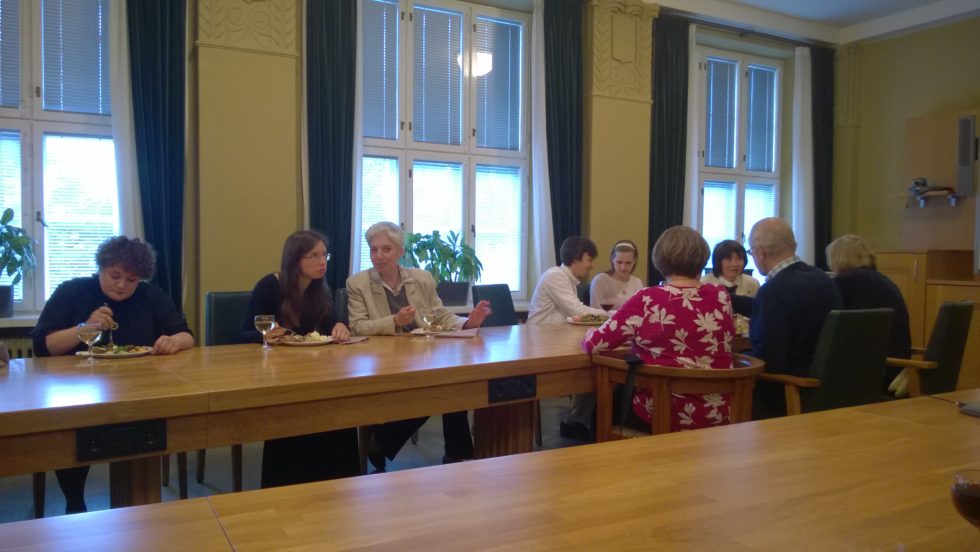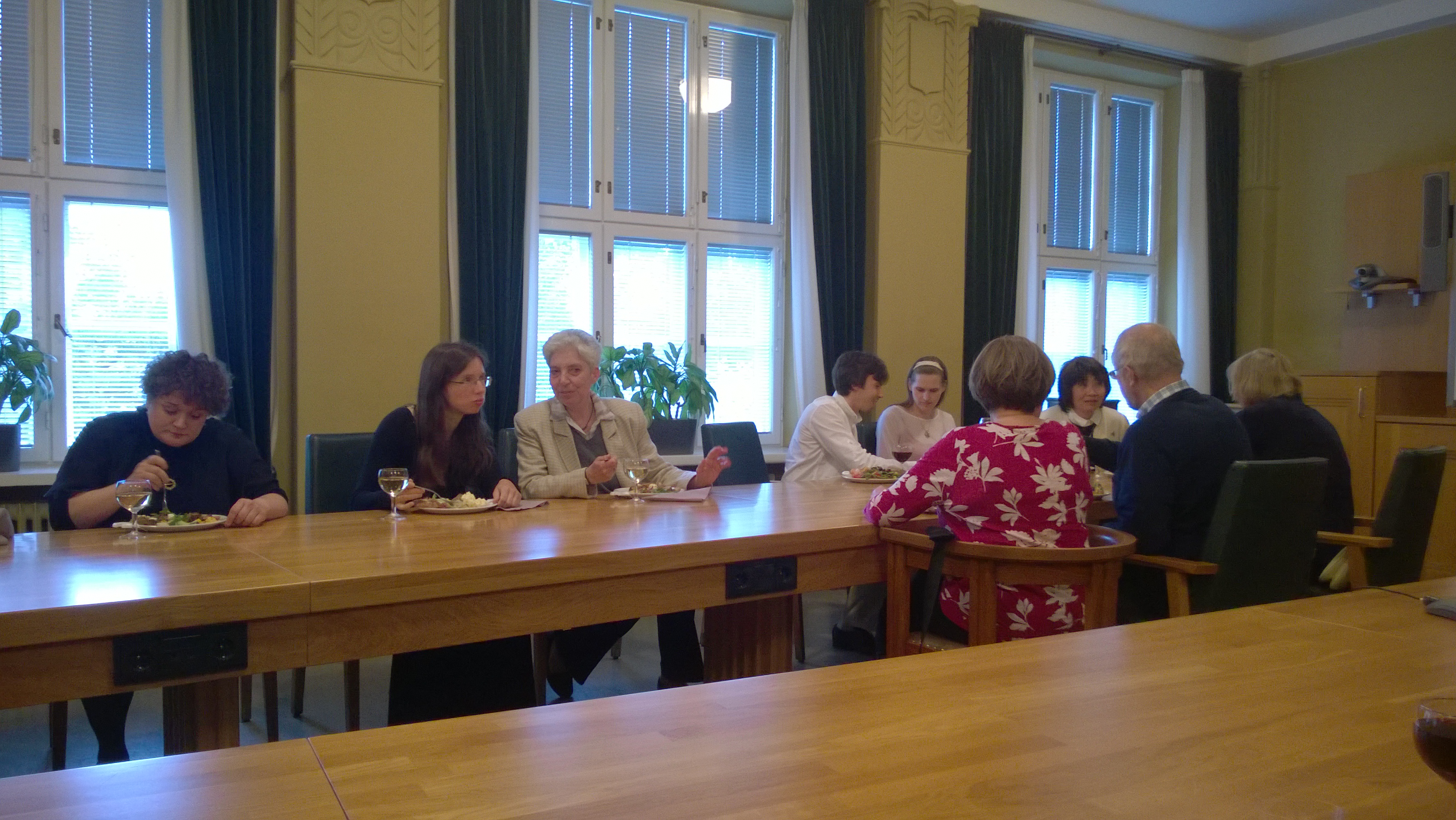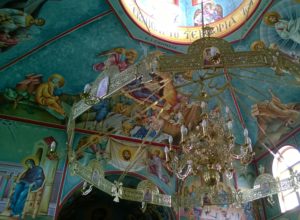
Previous entries in series:
The Magnificently Multivarious Individual
At meals, before and after the singing, we would find time to discuss amongst ourselves matters and truth and identity both profound and mundane. Everyone had an intense cultural curiosity, asking about language, geography, history, musical cultural, and any number of other things. The differences here were not so startling as the similarities (music jobs are scarce no matter where you look—we all should have been actuaries, it seems). Unsurprisingly, time and again, the conversation turned toward the greatest of truths and most profound of mysteries: the Divine. What I found left me both surprised and pleased.
It is easy for evangelical Christians, used to incredible diversity of thought (on some things more than others, of course) in a church united not so much by a specific set of doctrines and traditions than a set of foci, values that override most other concerns. However, I found just as much diversity among the Orthodox community that briefly came together in Joensuu. One might expect uniformity in a group united theologically (rooted in the Church Fathers, of course) as well as by practice, with everyone attending the same liturgies and vespers, knowing the order of the readings and hymns and chants. In fact, the prevalence of shared experience was so great, that multiple individuals would inform me after each vespers exactly which hymns and readings were left out for reasons of time. This uniformity is not a cage, however. It acts more like an origin from which springs a brilliant prismatic beam of variety. This can even be observed in the simple acts of faith and obeisance within the Divine Liturgy.
To an outside observer, each vespers or liturgy is full primarily of the entire crowd of worshippers crossing themselves and bowing again and again and again. This, however, is not a synchronized act. The differences abound—even when each member of the congregations act they proceed at different times, resulting in something like a wave of somatic symbology bouncing back and forth across the sanctuary. As I observed, I noticed some congregants bowed early and often, others seldom and late. Each seemed to act as they were accustomed, or perhaps as they felt led by the liturgy itself. The result departed from an expectation of tired ritual, which, though communal, still had the kernel of the individual within it.
The worldviews of each Orthodox believer I spoke to originated in the Bible, the church fathers, and the liturgy, but spread out from there in interesting ways. As I expected to find, some were quite fervent in their devotion, not to Christianity as such, but to Orthodoxy as the only true faith. The unique revelations and practices of the Orthodox invited exclusivity in their minds, looking less to the core of the Nicene or Apostle’s Creeds as the root of truth and more to the branches that diverged afterwards, so that what separates the Catholics, Orthodox, and high and low Protestants are actually more important than what unites us. It is difficult to judge, of course, since each of us in our heart of hearts believes in our own exclusivity. After all, if we weren’t fairly sure our worldview was correct, we would be inclined to try something else. I myself am quite sure of my own faith, but there is a curiosity that drives me to both value the unique perspective of others and believe that my faith is made more complete by seeing how it is reflected and examined by others.
There were some believers there that were even more open than I was. Seeming as if their Orthodox faith was an accident of birth rather than a conscious choice (as if, being born a bit differently, they could have been Catholic, Protestant, or polytheistic), they made overtures to the benefits of
learning from all the religions of the world. When they speak, the story of the blind men and the elephant comes to mind, where one touches the tail of the beast, and thinks it represents the whole of it, another touches the trunk and thinks the same, and so on. The metaphor is supposed to represent some whole truth of ours, of which each religion has a piece. An elephant, however, is a unified thing, in which there is no contradiction. A metaphorical elephant assembled out of the pieces of each religion could not exist, since each great religion of the world makes mutually exclusive claims of truth. We may each see only a portion of that which God reveals, but God does not reveal that “A is A” to one and “A is not A” to another.
There was another type of person I spoke to at the conference. There were those individuals who both fervently held to their Orthodox faith and sought to know God and themselves more fully through their interactions with others. It was with these people that I learned the most. Especially interesting to me was their mystical approach to truth. A lack of confidence was to them not a hindrance to be overcome. They saw many elements of God as a supreme mystery, meant not to be solved, since mystery was His nature. God the Father was totally unapproachable for them, while the Son was represented in all of their prayers and icons. Both revelation and mystery formed their worldview. They often said mystical things like “Jesus is truth. All truth is Jesus.” This, strictly speaking, is not a rational statement, but a meditative one. It makes faith more like a space in which one exists than a journey one takes. The eastern element of the Eastern Church was not lacking!
As our conversations continued throughout the week, I think I began to understand them a little better. Life was a holistic experience, where the mind, the heart, and all of the senses were united. Every symbol pointed to Christ, every ritual, every action, not least the sign of the cross, with which they covered their bodies again and again. Whether eating or drinking, singing or speaking, the divine mysteries seemed to pervade everything. It dawned on me that this consummation of experience might hold a particular key to Orthodox thought. But, that is an exploration better left for tomorrow.
0


Pingback: Gazing East, Part III | Neuestalgia()